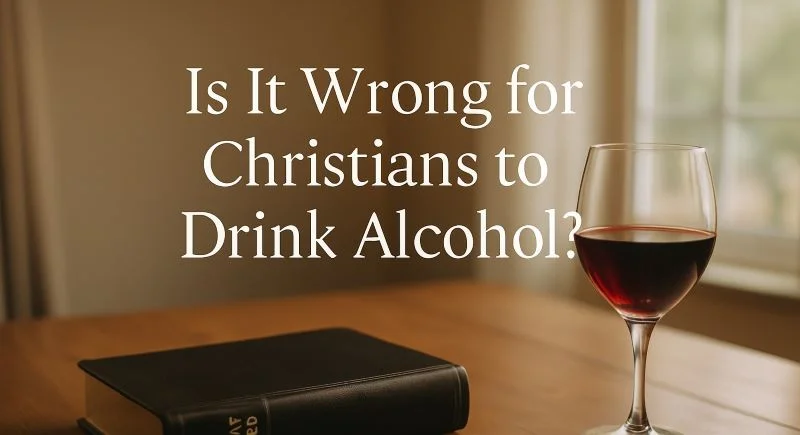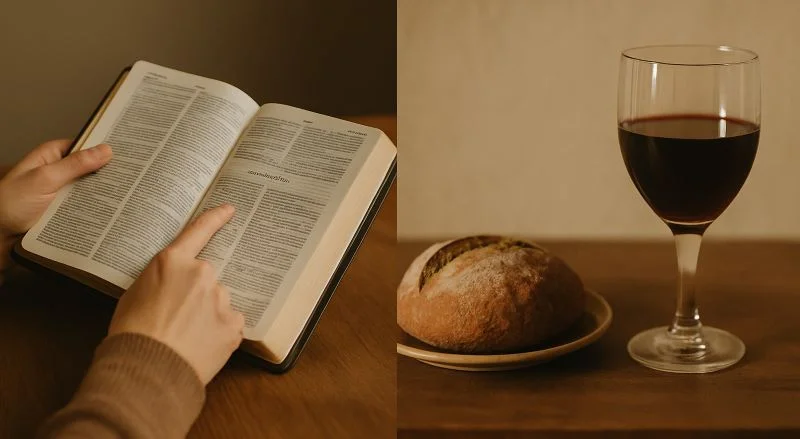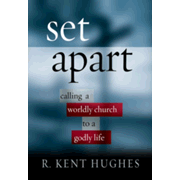
Exploring Biblical Freedom, Conscience, and Stumbling Blocks
As Christians, we often find ourselves asking questions like, “Can I do this?” or “Should I avoid that?” One of those recurring questions is: Is it wrong for a Christian to drink alcohol?
It’s not always black and white.
Galatians 5:1 reminds us that “it is for freedom that Christ has set us free.” But freedom in Christ doesn’t mean doing whatever we please. It’s about honoring God in our choices and walking in wisdom, love, and self-control.
This topic calls for balance. The Bible doesn’t forbid alcohol entirely, but it gives us clear warnings. It also calls us to be mindful of our conscience—and of others.
Let’s explore what Scripture says, how conscience and community fit in, and how we can make choices that reflect both our liberty and love.
What Does the Bible Say About Alcohol?

The Bible is neither silent nor unclear on the subject of alcohol. It presents both warnings and examples that guide our understanding.
Warnings About Drunkenness
The strongest biblical warnings are not against alcohol itself, but against drunkenness:
“Do not get drunk on wine, which leads to debauchery. Instead, be filled with the Spirit.” — Ephesians 5:18
“Wine is a mocker, strong drink is raging: and whosoever is deceived thereby is not wise.” — Proverbs 20:1 (KJV)
Drunkenness dulls our spiritual senses and hinders our ability to walk in obedience. God calls us to be sober-minded and alert (1 Peter 5:8).
Positive Mentions of Wine
At the same time, wine is sometimes viewed positively in Scripture.
Jesus’ first miracle was turning water into wine at a wedding (John 2:1-11). Psalm 104:15 speaks of wine as something “that gladdens the heart of man.”
Paul even told Timothy to “use a little wine because of your stomach and your frequent illnesses” (1 Timothy 5:23).
The key theme? Moderation and intent. The Bible doesn’t condemn drinking—it warns against the misuse of it.
Conscience and Christian Convictions
Each believer is on a unique journey with God. What feels right to one may not sit well with another—and that’s okay.
Romans 14 offers an important principle:
“Each one should be fully convinced in his own mind… whoever doubts is condemned if they eat, because their eating is not from faith; and everything that does not come from faith is sin.” — Romans 14:5, 23
Your conscience matters. It’s shaped by Scripture, personal experiences, and spiritual maturity.
It’s Okay to Say No
Some Christians abstain from alcohol entirely out of personal conviction. Maybe it’s because of past struggles, a family history of addiction, or a desire to set a strong example.
If that’s you, don’t feel pressured to conform. Your decision to say no is just as valid—and commendable.
It’s Okay to Say Yes (With Wisdom)
Others may feel at peace enjoying a glass of wine or a cold drink in moderation. If that’s your conviction, be sure it’s done with gratitude to God and self-control.
Paul says in 1 Corinthians 10:31:
“So whether you eat or drink or whatever you do, do it all for the glory of God.”
Stumbling Blocks: Loving Others More Than Liberty

One of the most sobering teachings on Christian freedom comes from 1 Corinthians 8.
Paul warns that our choices, though permissible, might lead others to stumble.
“Be careful, however, that the exercise of your rights does not become a stumbling block to the weak.” — 1 Corinthians 8:9
What Is a Stumbling Block?
A stumbling block is anything that causes another believer to fall into sin or question their faith. For some, seeing a fellow Christian drink alcohol might trigger a personal struggle.
This doesn’t mean we must live in fear of offending. But it does mean we live with love and awareness.
Love Over Liberty
In some cases, love means limiting our freedom for the sake of others. That’s what Christ did for us. He gave up His rights to serve, to save, and to lead us back to God.
As Paul says in Romans 14:21:
“It is better not to eat meat or drink wine or to do anything else that will cause your brother or sister to fall.”
Historical and Cultural Perspectives
In Bible times, wine was a common beverage. It was safer than water and part of many social customs.
But wine then wasn’t the same as today’s alcohol. It was typically diluted and much weaker.
Over the centuries, Christian traditions have responded to alcohol in different ways:
- Catholics and Orthodox believers often view moderate drinking as acceptable, even part of sacramental life.
- Evangelicals and conservative Protestants have sometimes promoted total abstinence—especially during revival movements or in response to alcohol abuse.
The church’s response to alcohol has been shaped by both Scripture and culture. Today, we are called to navigate these tensions with discernment, grace, and love.
How to Make a Wise, God-Honoring Decision
Here are some questions to help you examine your heart and your habits:
1️⃣ Is it lawful—and beneficial?
“I have the right to do anything”—but not everything is beneficial. — 1 Corinthians 10:23
2️⃣ Is it becoming a habit?
Even good things can become idols. Make sure alcohol doesn’t take a place in your life that only God should fill.
3️⃣ Is it loving to others?
Would your choice cause someone close to you to stumble or struggle?
4️⃣ Is your conscience clear?
If you feel uneasy, listen to that. God may be prompting you to abstain.
5️⃣ Are you glorifying God?
If your answer is yes, move forward in faith. If not, pause and pray.
Key Takeaway
Alcohol is not inherently sinful, but it can become a stumbling block if not approached with wisdom, love, and self-control. As believers, our decisions should reflect both our freedom in Christ and our love for others.
FAQs About Christians and Alcohol
Does drinking alcohol mean I’m sinning?
Not necessarily. The Bible condemns drunkenness, not moderate drinking. What matters is your intent, your heart, and the effect it has on you and others.
What if I’ve struggled with alcohol in the past?
It’s wise to avoid it altogether. There is no shame in setting boundaries that protect your spiritual and physical health.
How can I explain my decision not to drink to others?
Speak with humility and grace. You don’t need to judge others—just share your conviction and let your peace in Christ speak for itself.
Should Christians drink around unbelievers?
Consider your witness. Will it point them to Christ or confuse them about your faith? Use discernment.
Conclusion: Walk in Freedom, Love, and Wisdom
So, is it wrong for Christians to drink alcohol?
It depends on your heart, your conscience, and your influence. Freedom in Christ doesn’t remove responsibility—it increases it. With every choice, we have the opportunity to glorify God or gratify self.
Let’s be a people marked by grace, truth, and love. Whether you choose to drink or abstain, let your decision be rooted in Scripture, shaped by love, and led by the Spirit.
A Gentle Challenge for You
Spend time in prayer. Ask God for wisdom in this area of your life. Reflect on your motives, your conscience, and your impact on others.
And if this post helped you, would you share it with someone who’s wrestling with the same question?
Let’s continue growing together—rooted in truth, grounded in grace.
Affiliate Disclaimer
This post contains affiliate links. If you click on one of the links and make a purchase, I may receive a small commission at no extra cost to you. I only recommend products I truly believe in and think will be beneficial to my readers. Thank you for supporting Biblical Christianity!
Recommended Resource:

|
Set Apart: Calling a Worldly Church to a Godly Life – eBook
By R. Kent Hughes A powerful call to holiness in a world of compromise. This book addresses key areas of Christian living—including media, marriage, and lifestyle—challenging believers to reflect God’s character in every part of life. |

Hi. I am not religious, but I don´t deny anything either.
I believe we are created by some higher spirit, if you want to call it so. Some religious people may say that if you are not religious, then you can’t believe in anything. I don´t like the word “believe” because that word doesn´t mean that it is the absolute truth. It is a belief. But I use that word anyway.
I believe the teaching from Earth’s native people. Native American people. They know how to live in harmony with nature, animals, and speak of a higher spirit, a Father.
We, White people, have come to this earth after them. And in my opinion, we white people are dangerous. Not everyone, of course. I have read that the Bible has been filled with many misleading statements by “someone.” And when we know how dangerous alcohol is, and still the bible says to us to drink it, BUT you shouldn´t get drunk.
It´s like saying to a fox sitting in a hen house, “You shall only watch, but you shall not eat.” So I would say that this alcohol thing is one of those misleading things in the bible.
Native American people didn´t have alcohol. Only after the white man gave it to them, and then they got slaughtered. White men gave alcohol to them on purpose because they knew they would get drunk and be easy to kill.
Many of those white men were Christians also.
Hi RR, thank you so much for taking the time to share your thoughts. I really appreciate the honesty and depth you brought to this conversation.
I agree with you that many Indigenous cultures, like Native American communities, have a deep sense of reverence, harmony with creation, and respect for the Creator. There is so much wisdom there, and many Christians (myself included) see God’s fingerprints in that longing for the divine and in the way they honor creation.
You also raised a very real and painful part of history. What was done to Native peoples, often under the banner of “Christianity,” was tragic, evil, and absolutely not reflective of the teachings of Jesus.
True Christianity doesn’t justify harm, oppression, or manipulation of any group. Jesus taught love, humility, and protection of the vulnerable, not violence or exploitation.
Regarding alcohol: you’re right that it has caused enormous harm. The Bible’s teaching is not an encouragement to drink but a warning about the dangers of drunkenness and losing self-control.
Some Christians (like myself and my husband) freely choose not to drink at all because of that. Others may drink moderately. But no one is commanded to drink alcohol, and Scripture never excuses the kind of destruction you described.
I appreciate you raising these points; it adds so much to the conversation, and I’m glad you felt comfortable sharing your perspective here.
Thank you again, RR, for engaging so thoughtfully. 🙏 If you ever want to continue the discussion, you’re always welcome.
This article provides a thoughtful and balanced examination of what the Bible really says about alcohol.
I appreciate how it makes clear that Scripture doesn’t prohibit drinking entirely—but it strongly warns against drunkenness and misuse, while emphasizing respect for one’s own conscience and consideration for others.
It’s refreshing to see both the positive biblical references to wine as a gift from God and the many cautions against abuse presented together.
I especially liked how the post navigates the tension between celebration and restraint. Did you find that different Christian traditions’ perspectives—such as those that practice total abstinence—were accurately and fairly portrayed in the article?
Hi Hanna,
Thank you so much for your kind and thoughtful comment. I’m really glad the post resonated with you!
You’ve beautifully summarized the heart of what I hoped to communicate: that Scripture calls us to wisdom, self-control, and love in how we handle matters like alcohol, rather than rigid rules or careless freedoms.
I appreciate your question about how different Christian traditions were portrayed. I did aim to reflect their views fairly and respectfully, recognizing that historical and cultural contexts have shaped those perspectives.
Total abstinence, for example, often arose from a sincere desire to protect others and pursue holiness, especially during times when alcohol abuse was devastating communities. That kind of heart, whether one chooses to drink or not, matters deeply.
Thanks again for engaging with the topic so thoughtfully!
Grace and peace,
Alice
Probably this, Noah and Lot got drunk.
Scriptures are against consumption of strong drink in Isaiah 5:11, 22, 24:9. But attention to Isaiah 29:9, they are drunk, not with wine or strong drink. Paul said 1 Timothy 5:23, Drink a little wine for stomach’s sake. Amos 9:14. Christian/creationists like myself have said it; Noah and Lot did not deliberately get drunk.
I ponder on the word ‘deliberate’, my point being that God created all vegetation/fruit. Man, therefore unaware that drinking fermented drink would make him drunk. Then, in the book of Leviticus, do we abstain from eating bread made with yeast?
I will research this, the law of the Levites. Fruit left in water sometimes drunk would make you tipsy. I, too, earlier in my youth was a heavy drinker.
Thank you for your input, Nicholas. I really appreciate it.
You made a valid point about Noah and Lot likely being unaware that consuming fermented drinks would lead to intoxication. I would love for you to return with the findings of your research to clarify this topic.
Blessings!
This was an interesting topic.
Jesus drank wine all the time; they even had lots of wine at the table in pictures I saw as a kid. Either way, it was a good read! I drink wine every once in a while; it’s not an end all be all situation.
Hi Stormy,
Thanks so much for reading and sharing your thoughts! You’re right—this is definitely an interesting and often-debated topic.
You’re also not alone in mentioning Jesus and wine. Many people refer to His first miracle at the wedding in Cana to support moderate alcohol use, and it’s something I’ve heard quite a few times, too.
That said, I think it’s helpful to remember that the wine during biblical times was quite different from the strong alcoholic beverages we have today. It was typically diluted and used more as a daily staple—often safer than water—rather than something consumed for intoxication.
Ultimately, I believe it comes down to our heart posture, conscience, and how our choices affect others. I appreciate you taking the time to read the post and reflect on it!
Blessings!
Hi Alice,
Great article, I feel the need to thank you. What a balanced, gracious perspective! I really appreciated the way you put it all in Scripture—such as emphasizing both the warning in Ephesians 5:18 and Jesus turning water into wine—without oversimplifying it.
The emphasis on conscience, love for others, and avoiding obstacles resonated deeply. As someone who grew up in a church where views on alcohol varied greatly, your call for wisdom over legalism was refreshing and unifying.
I especially liked the practical questions at the end (e.g., “Is it love for others?”). They gave me clarity as I navigate gatherings where this topic comes up.
A question for you: How do you approach discussions with believers who lean toward total abstinence due to cultural background?
Thank you for writing with such warmth and truth. This is a resource I will happily share!
Blessings,
Mitia.
Hi Mitia,
Thank you so much for your kind and encouraging words. I’m truly grateful that the post resonated with you, and it means a lot to know you found it both scripturally grounded and balanced.
To answer your thoughtful question: our church family actually leans toward total abstinence from alcohol. It’s a fairly conservative stance, not necessarily rooted in cultural tradition, but more so in response to the realities of our local community.
Sadly, drunkenness is quite common here and often leads to conflict and relational problems, so our leaders have taken a cautious and protective approach.
My husband and I personally share that conviction. Interestingly, before coming to faith, my husband would occasionally drink socially with friends. But over time, we both came to see the value of abstaining—not out of legalism, but as a matter of conscience and witness.
That said, we do know fellow believers from other congregations who drink in moderation and do not abuse it. We don’t judge them, but we’ve also heard unbelievers in our community question why some Christians not only drink but even sell liquor in their stores.
It’s a sobering reminder (no pun intended 😊) that our example matters, especially to those watching from the outside.
I haven’t personally had many deep conversations with Christians who hold a different view, but I believe it always comes back to the heart: Are we walking in love? Are we building up others? Are we honoring God in our choices?
Again, thank you for your thoughtful engagement—and for your heart to share this with others. May the Lord continue to give us grace and wisdom in all things.
Blessings,
Alice
When it comes to the subject matter of can a Christian drink alcohol, many are divided on this topic.
I, for one, do not drink alcohol now, nor would I encourage anyone to be a partaker of this.
Before I gave my life to the Lord, I used to drink and there was a time when I got a hangover.
The danger with drinking alcohol as a Christian is running the risk of a little too much that can lead to drunkenness, which is a sin.
Thank you for sharing your personal testimony, Norman. I appreciate your heart and the caution you bring to this discussion.
You’re absolutely right—Scripture is clear that drunkenness is a sin, and the risk of crossing that line is real. It’s wise to recognize where our past struggles or convictions lead us to draw firmer boundaries, not just for ourselves but also for the sake of others who may be watching or following our example.
I believe your comment highlights an important point: while the Bible allows for freedom, that freedom comes with responsibility, discernment, and love for others.
Thank you again for contributing to the conversation with grace and conviction.
Thank you, Norman
I just had a debate with my friend who smokes and is addicted. She said, “well you drink.” But I do it sparingly and responsibly.
I don’t get drunk because that would be a sin. I think in moderation and under control it will be ok but I am finding alternatives like magnesium to calm me down.
Pray for her addiction and her heart to soften and not judge me because God does not and he is not convicting me of a bad habit.
Hi Deanna, thank you for sharing your perspective and for being honest about that conversation with your friend. You’re right that Scripture clearly calls drunkenness a sin, but it also speaks a lot about the heart—our motives, our self-control, and how our choices affect others (Romans 14:13; Galatians 5:22–23).
I appreciate that you are being thoughtful and prayerful about your own habits and that you’re seeking healthier ways to handle stress. That’s a sign of maturity and growth. I will absolutely be praying for your friend as well—both for freedom from addiction and for healing in your friendship. Sometimes when someone is struggling, their pain comes out sideways. Your compassion and patience will speak louder than the debate ever could.
We’re all on a journey of sanctification, and the Lord is so faithful to meet each of us exactly where we are.